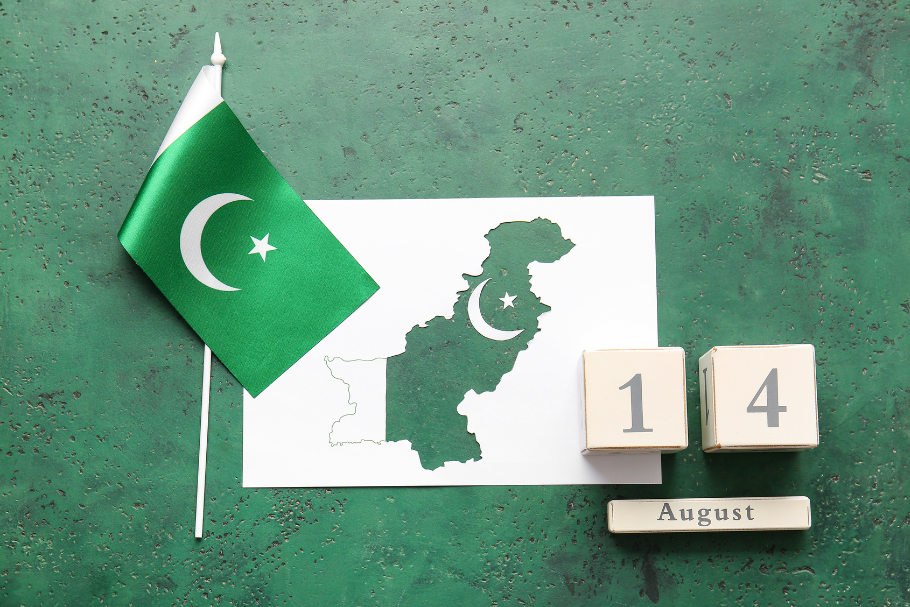Pakistan’s Independence Day – 14 August A Journey Through History and Celebrations

Pakistan's Independence Day - 14 August A Journey Through History and Celebrations
Pakistan’s Independence Day!
Every year on the 14th of August, Pakistan comes alive with vibrant celebrations, marking its Independence Day, known as “Yāum-e-Āzādi” in Urdu. This auspicious occasion stands as a powerful reminder of Pakistan’s triumphant journey towards sovereignty, signifying the culmination of British colonial rule in August 1947.
Behind this significant milestone lies the dedication of the Pakistan Movement, masterfully orchestrated by the All-India Muslim League under the guidance of the visionary Muhammad Ali Jinnah.
The movement’s goal was unequivocal: to forge a distinct Muslim state within the northwestern realms of British India through the process of partition.
A watershed moment materialized through the enactment of the Indian Independence Act of 1947. Under its provisions, the British Raj granted independence to the Dominion of Pakistan, encompassing both West Pakistan (modern-day Pakistan) and East Pakistan (now Bangladesh).
Remarkably, this historic event was intertwined with the revered Laylat al-Qadr, Ramadan 27, according to the Islamic calendar, underscoring its profound spiritual significance.
The heart of Independence Day celebrations beats in Islamabad, Pakistan’s capital, where pivotal government edifices, including the Presidential and Parliament buildings, become emblematic sites. Against this backdrop, the grandeur of the event unfurls as the national flag is raised, accompanied by the stirring strains of the national anthem.
The air resonates with live speeches by leaders, infusing the occasion with a sense of unity and national pride. The program is a medley of patriotic fervor, characterized by flag-raising ceremonies, vibrant parades, captivating cultural performances, and soul-stirring renditions of patriotic songs.
To honor outstanding achievements, a constellation of award ceremonies also graces this celebratory stage. The citizens themselves play a starring role, adorning their homes, vehicles, and attire with the national flag, a symbol of their enduring bond with their beloved nation.
Peering into the annals of history, we encounter the tapestry of Pakistan’s past intricately woven with the fabric of the British Indian Empire. The 17th-century advent of the East India Company on the subcontinent’s shores marked the genesis of a colonial era.
This era’s transformative events culminated in the British Crown’s direct control, following the Indian Rebellion of 1857, via the Government of India Act 1858. Amid simmering tensions between Hindus and Muslims, the All-India Muslim League emerged in 1906, advocating for the safeguarding of Muslim interests amidst a changing political landscape.
The aftermath of World War I was marked by fervent calls for self-governance, buoyed by British reforms. In this cauldron of ideas, Allama Iqbal introduced the concept of a separate Muslim state, and Chaudhary Rahmat Ali proposed “Pakistan” as a moniker for these regions.
The 1940s witnessed a crescendo of Muslim nationalism led by Muhammad Ali Jinnah. This fervor culminated in the creation of Pakistan as a distinct Muslim state, imbued with an unyielding spirit.
With the stage set, the Labour government in Britain recognized the imperatives of relinquishing control over British India. The subsequent division of the subcontinent into the Dominion of India and the Dominion of Pakistan was cemented, leading to the transfer of power on August 15, 1947.
This momentous transformation was enshrined by the Indian Independence Act of 1947, heralding Pakistan’s emergence as a sovereign nation. Karachi witnessed history as Muhammad Ali Jinnah was sworn in as Pakistan’s first governor-general on August 14, 1947.
As the calendar flips to August, Pakistan bursts forth with jubilant celebrations, embracing the spirit of Independence Day. The national flag flutters high, impassioned speeches resonate, and parades punctuate the streets. Every corner bears witness to the nation’s unity and spirit, adorned with the symbols of the nation’s identity.
Special prayers echo in mosques, underpinning the nation’s aspirations for progress and harmony. Media channels echo with patriotic anthems, reflecting the spirit of the land.
In recent years, technology giants like Google and Facebook have joined the festivities by adorning their interfaces with Pakistan-themed designs, sharing in the nation’s pride.
This day is more than a celebration; it’s a poignant reminder of the sacrifices woven into Pakistan’s fabric, and a testament to the ongoing commitment to fortify the nation’s foundations.
Security measures cast a protective shield around the celebrations, ensuring a peaceful ambiance despite the challenges. Amid the jubilance, the solemnity of honoring those who shaped the nation’s destiny takes center stage.
Delving into popular culture, we find literary gems, films, and art that paint vivid portraits of Pakistan’s journey to independence.
The airwaves resonate with milli naghmay, fostering a collective sentiment of unity. The Pakistani diaspora, scattered across the globe, joins in the celebrations, reaffirming the abiding link between the homeland and its global citizens.
As we delve into Pakistan’s Independence Day, the heart swells with pride, and the spirit soars on the wings of history. It’s a tapestry woven with sacrifice, determination, and a resilient commitment to freedom.
For More Related Articles Browse Our Website Blogster.pk
For social Connection You can also Visit and follow our Social media Platforms
Facebook , Instagram, Linkedin, Pinterest, Quora, Twitter, Youtube.






